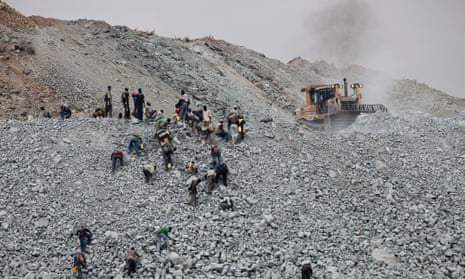A British gold mining firm whose hired police officers were involved in an incident that saw Tanzanian villagers killed and injured has settled claims brought against it in the London high court.
Twelve villagers, including relatives of people who died in incidents near the North Mara mine, sued African Barrick Gold, now renamed Acacia Mining, in Britain’s High Court in 2013. They had claimed the company’s subsidiary, North Mara Gold Mine Ltd (Nmgml) had failed to prevent the use of excessive force by police and security which had led to six deaths and other injuries in 2008.
Acacia Mining denied all the claims but under the terms of the out of court settlement, it is not known how many people were compensated or how much they were awarded. A spokesman for Acacia said in a statement: “The claims were denied by Acacia Mining and Nmgml and litigation and further claims have been settled out of court.”
However, it is believed that six of the claims relate to deaths at the mine and three to people shot and injured, including one man who was paralysed following a gunshot to his spine.
Acacia mining, whose parent company Barrick Gold Corp is the world’s largest gold mining company, had claimed that the villagers died when hired police officers and their own security guards came under attack from people trying to invade their large open-pit mine which is close to several villages in the far north of Tanzania.
In 2011 the company told the Guardian in a statement: “the majority of the claims ... originate from an incident which involved violent intruders who invaded the mine. After receiving repeated warnings of the risks associated with such activities, some of these intruders were injured by members of the Tanzanian police acting in self defence or in defence of the safety of mine employees.”
The mine, which employs several thousand people, has had a troubled history with allegations of pollution, human rights abuses and calls for it to be closed. In one incident, in 2008, local people broke into the site and allegedly destroyed $15m (£10m) worth of Barrick property. In 2009, Barrick said that it had launched an investigation into allegations of sexual assault at the mine but the results were not disclosed.
British law firm Leigh Day, acting for some of the injured and relatives of the dead, had claimed in the London high court that the police hired by Acacia were an integral part of the mine’s security and that the company had used tear gas and live bullets against villagers.
The company rejected all accusations that it was complicit in the deaths and injuries and and said it would not compensate illegitimate claims.
Tanzanian and international human rights groups welcomed the financial settlements but said multinational companies working in African countries were often able to silence local dissent and mostly only acted on human rights abuses when cases against them were taken to rich countries like Britain.
“We are aware that other people in the [North mara] community who had also suffered injuries accepted the limited compensation which the company [first] offered. They later found that this was insufficient to cover their needs since they have injuries which will hamper them for their rest of their lives. We understand that they were required to waive their legal rights as [a] condition of getting compensation,” said Fiona Gooch, policy officer with Traidcraft.
The case follows 15,000 villagers in the Niger delta settling with Shell for £55m of compensation in London last month for damage done to livelihoods by oil pollution in 2011. The original offer for compensation is understood to have been £4,000.

Comments (…)
Sign in or create your Guardian account to join the discussion